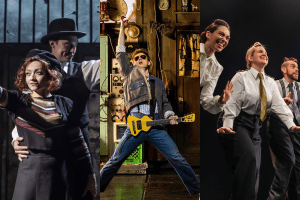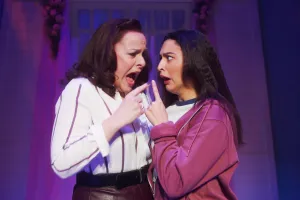Brief Encounter With … Bonnie Greer
Bonnie Greer‘s 2007 ‘play with songs’ Marilyn and Ella, about the largely undocumented friendship between Marilyn Monroe and Ella Fitzgerald, receives its West End premiere at the Apollo Theatre on Sunday (15 November 2009).
As well as her plays, which include Munda Negra and Jitterbug, she is also the author of two novels and the recently published memoir Obama Music: Some Notes From A Southsider Abroad. Her jazz oratorio 48 premieres at the Royal Festival Hall later this month. She regularly appears on the BBC’s Newsnight Review programme, and last month hit the headlines for her appearance alongside BNP leader Nick Griffin on an edition of Question Time.
What was the genesis of Marilyn and Ella?
Back in 2004, I stumbled on a little incident in the life of Marilyn Monroe. In 1955, she helped Ella Fitzgerald get a job in a nightclub, the Mocambo in West Hollywood, that at the time didn’t hire black people. I couldn’t believe it, that the great white icon Marilyn Monroe, someone we’ve heard so much about in terms of her glamour and tragic personal life, was involved in her own small way in the civil rights movement. America was still segregated at the time, yet Monroe made a mark, which I thought was mind-blowing.
I wrote a radio play about it for the BBC that went out in 2005, and then I did a stage version, a two-hander, which we took to Edinburgh in 2007. It was full of classic songs and based around Marilyn and Ella meeting each other backstage at the Mocambo club. This is the version we’re reviving at the Apollo.
Why do you think the story’s remained largely unreported?
Well I’ve talked to authors who have written books on Marilyn Monroe, as well as to her fans, and I think it’s because people want to keep her image a certain way. In many ways she’s the ultimate white woman, with a capital W and a capital W. She’s kind of a sacrifice, a martyr, and a lot of people don’t want to think of Marilyn as being proactive, or think of her as being in control of her life or being clear about things. This play really maps out how hard that woman worked. She worked enormously hard to get where she was, but there are people who really don’t want to know that about her.
It’s billed as a ‘play with songs’.
It starts with a black British jazz singer today, telling us about how she found the story. She tells us that she’s imagining the story, and she takes us on a journey back to 1955, when Ella is given this chance and finds out that the person who made it possible was Marilyn Monroe. And so, Ella has to face the fact that the most beautiful woman in the world is a massive fan of hers. That’s a shock for her, because Ella has never considered herself to be worthy of anyone being interested in her for anything other than her voice.
And Marilyn discovers a kindred soul, a sister. They both had deprived, abusive childhoods, they both worked their way from the streets to the top of their professions, they both battled to be where they were. Marilyn was the first woman to have a production company in the history of motion pictures. They had an enormous amount in common, which no one on the surface would have assumed they would. It’s also an exploration of a deep friendship, and how it can happen to two improbable people. The songs in it are sung by the actress playing Ella, classics like “I’ve Got You under My Skin” and “Mack the Knife”.
As a dramatist, how do you go about portraying two such icons of popular culture?
Fundamentally, I think writing two characters is the hard part because you have to create the drama between them. I think the story, the incident, is so surprising – for Ella fans who had no idea that she had to go through something like this, and Marilyn fans who had no idea that she was involved in the civil rights movement in her own small way – so putting them up there as two human beings is what I’ve tried to do. These are two women who found each other as friends and companions and, at the end of the day, one of them couldn’t accept the friendship. It’s sad, but glorious at the same time. Marilyn went out on a limb; she could’ve lost her career and a lot of other things. But she took that chance, while Ella held back.
The play obviously deals with the issue of race, a subject that seems very timely.
Absolutely. On the sofas, we can all pay lip service to diversity. What we don’t see is the toll that racism and segregation and exclusion take on society. You don’t see the energy that’s wasted in holding back another human being from their full potential, be it a woman, a disabled person, a person of another sexual preference; it takes an enormous amount of energy to maintain that kind of society. We lose talent and a lot more besides in a society like that.
Do you get frustrated that it’s still an issue in the 21st century?
I think it’s still an issue because some people are still afraid and ignorant. And when I say ignorant, I mean that people don’t get exposed to the ‘other’. It’s about coming out of your comfort zone to see what the ‘other’ is like. I’d say my experience in this country has largely been about meeting people who are not like myself, and learning about myself and about them in equal measure. If we open up just a little bit more, we see the commonality that we all have.
I really want to show in this play that Marilyn and Ella are just two human beings. They were celebrated but they found common ground in their suffering. One is a woman who couldn’t go any further in her career because of her gender. The other is a black person who couldn’t go where she wanted to go because of her colour. It was just a waste of talent, and energy, to try and suppress them.
What kind of feedback have you received since your appearance on Question Time?
People of all different backgrounds have spoken to me about it, many of whom have stopped me in the street, and generally they seem to be pleased with the show. I think the reason – and I’m still trying to understand this because I don’t I think I really did anything – is that the British people needed to hear that they’re not going be living in a country run by the BNP. No matter how many troubles we have here, how much anger there is, how many things we’re trying to sort out, there is no way that the British people would allow the BNP to have any kind of hold on this country.
I went to a meeting of visual artists the other day who were all of ethnic minorities. It was an example of how extraordinary the UK is. This country, compared to France, is like New York City as far as diversity and integration is concerned. It’s a small country, a small island, and despite the amount of incoming (I don’t like to use the term ‘immigration’) that has happened over millennia on this island, it has not disintegrated, there’s no fighting in the streets, and it’s created a country that’s truly extraordinary. The BNP are not British, they don’t represent the British way of doing things. I think people were just grateful to hear somebody say that there’s absolutely no way it’s going to happen here.
– Bonnie Greer was speaking to Theo Bosanquet
Marilyn and Ella, which is directed by Colin McFarlane and stars Suzie Kennedy and Hope Augustus, is at the Apollo Theatre on 15, 22 and 29 November, with performances at 15.30 (only 22 and 29) and 19.30.












